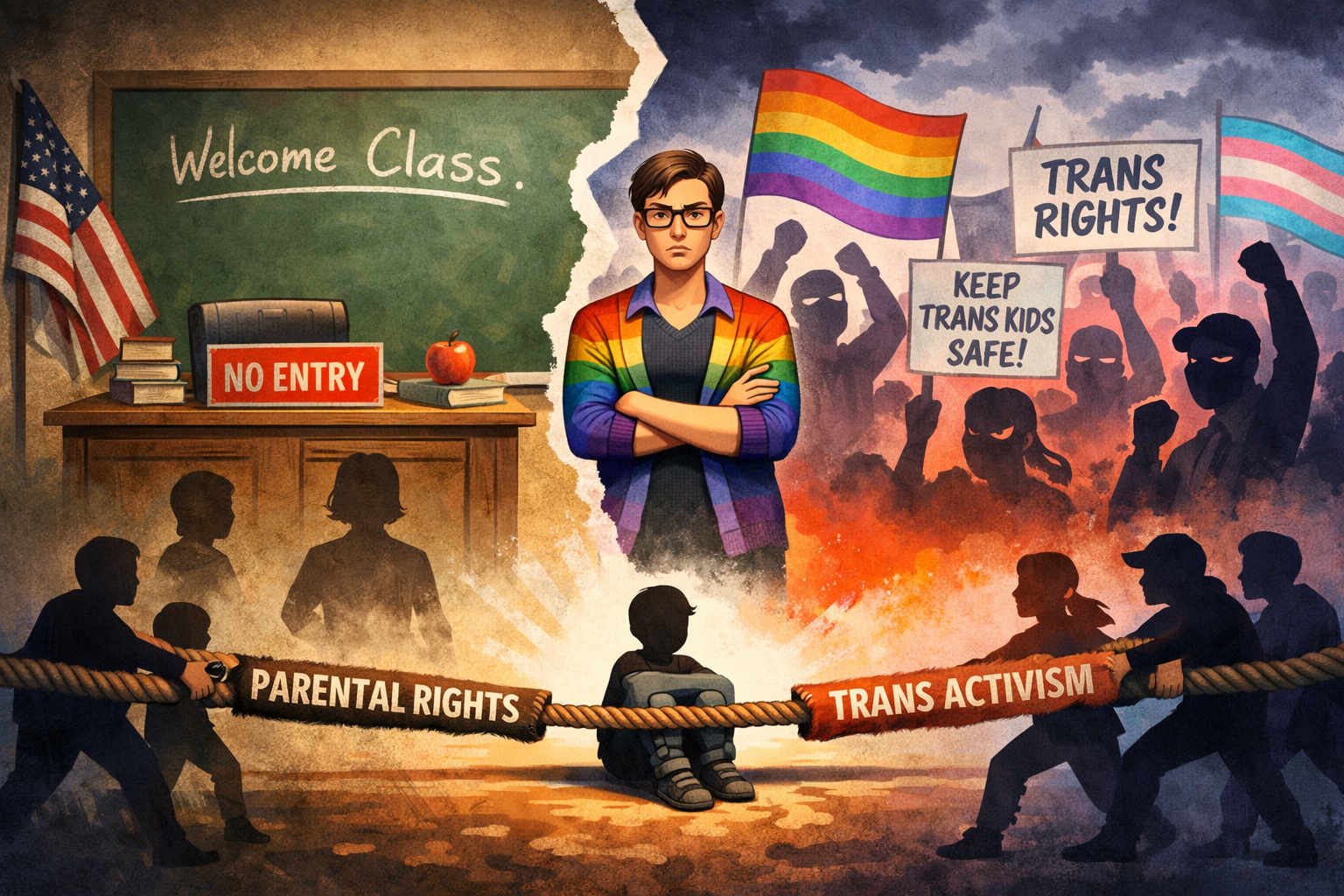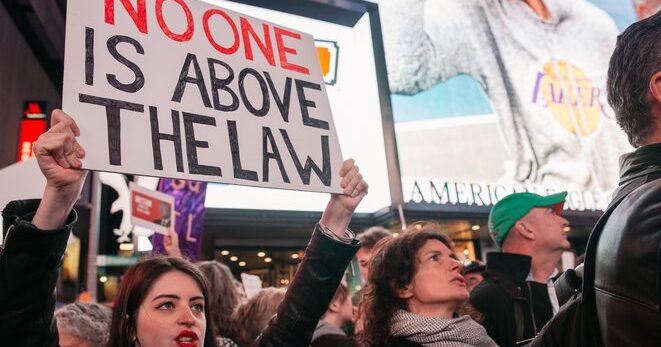The socialist journalist and novelist Upton Sinclair published The Jungle in 1905. Centering on the toils and tragedies of immigrant families in Chicago, his novel exposed the hardships and abuses suffered by the American working class at the turn of the century. He hoped to spark a conversation about the rights of workers. Instead, his descriptions of slaughterhouses and sausage-making disgusted a nation, leading to the first meaningful food safety legislation in American history. Keep reading to learn more about The Jungle and the history of food safety in the United States.
The Jungle
Upton Sinclair was a radical journalist, activist, and novelist whose extensive body of work centers on the struggles of the American working class. A card-carrying Socialist, he sought to use art to expose what he viewed as the destructive effect of industrial capitalism upon the fabric of working class society. The entirety of The Jungle, his most famous work, is available on HeinOnline, in a scanned facsimile of the first standalone edition published in 1906.

While researching for The Jungle, Sinclair spent seven weeks in 1904 working undercover in the meatpacking plants in Union Yards in Chicago for the Socialist newspaper Appeal to Reason. The Jungle was initially published in serialized form in Appeal to Reason in 1905. Sinclair struggled to find a commercial publisher for a year, before Doubleday picked up the book in 1906, resulting in the book that was ultimately scanned for HeinOnline a century later.

The Jungle tells a bleak tale of misfortune. The plot centers on the protagonist of Jurgis Rudkus, an immigrant from Lithuania who has settled in the neighborhoods of the meatpacking district in Chicago. The novel opens with a happy scene, as Jurgis marries his childhood sweetheart, Ona, in a traditional Lithuanian wedding ceremony. This is, sadly, the high point of the plot, the trajectory of which is decline and ruin for Jurgis and his family, as they suffer a series of misfortunes at the hands of predatory landlords and employers.
Initially, Jurgis and his family are optimistic about their prospects in their new country. For them, the city of Chicago represents hope and opportunity: “It was in the stockyards that Jonas’s friend had gotten rich, and so to Chicago the party was bound. They knew that one word, Chicago,—and that was all they needed to know, at least, until they reached the city.” However, on their way to Chicago, they fall victim to a series of unscrupulous officials and business owners, who take advantage of their limited knowledge of English and American culture to con them out of the majority of their funds. Jurgis’ extended family arrives in Chicago nearly penniless. They settle into their home, in the shadow of industrial slaughterhouses and stockyards that employ the men of the community. Sinclair describes the neighborhood in apocalyptic and ominous terms: smokestacks loom over the houses, spewing forth “columns of smoke, thick, oily and black as night…spread in vast clouds overhead, writhing, curling…stretching a black pall as far as the eye could reach.”

Jurgis secures employment on the killing floor of one of the slaughterhouses. Initially, although the work is difficult and the hours long, things seem to be looking up for the family: “The stench was overpowering, but to Jurgis it was nothing. His whole soul was dancing with joy—he was at work at least! He was at work and earning money!” However, the money proves to be inadequate to support the family. Soon, all twelve members of the household (five adults and seven children) are forced to find work to afford their rent. Illnesses and injuries begin to take their toll on the family, and debts pile up. There are moments of joy and hope nevertheless. Jurgis and Ona have a child. Jurgis joins a union and becomes an American citizen, albeit in what appears to be a ballot-stuffing scheme of some sort. But Jurgis takes up drinking and gambling, making their finances even more precarious.
The turning point comes when Ona reveals that she has been raped by her employer, Mr. Connor, who has been subsequently blackmailing her into a relationship with him. Enraged, Jurgis goes to Ona’s workplace the next day and attacks Connor. He is imprisoned and loses his job. Upon release, he struggles to keep employment, and spends what little money he has on alcohol. Tragedies compound. Ona dies in childbirth. Jurgis finds some solace in raising his son, only for tragedy to befall once again when the boy falls in the street and drowns in the gutter. Jurgis then begins a period of homelessness, resorting to crime to feed himself and his vices. However, Jurgis finds redemption in the final act, when he chances upon a Socialist orator delivering a speech. He cleans himself up, gets sober, and dedicates his life to the anti-capitalist cause. The novel concludes with a fiery Socialist speech, with the book’s last words: “CHICAGO WILL BE OURS!”
“I aimed at the public’s heart and by accident I hit it in the stomach.”
Upton Sinclair’s main goal in publishing The Jungle was to expose what he viewed as the predatory practices of American capitalists upon working class people, and present what he deemed to be the best remedy for these misdeeds. As scholar Ralph S. Tyler writes: “There is nothing subtle about the theme of The Jungle…For Upton Sinclair, speaking through Jurgis Rudkis, socialism is the answer.“ Sinclair wrote The Jungle hoping to help bring about sweeping social change in the United States. And in a way, he succeeded. However, the change was not one of revolution but one of regulation.
Sinclair’s book was a sensation, and was widely read by the American public following its reprinting by Doubleday in 1906. Readers were, just as Sinclair hoped, outraged by what they read in the novel. However, it was not the exploitation of workers that stirred public sentiment. As Roger Roots writes in “A Muckaker’s Aftermath”: “Although Sinclair clearly intended The Jungle to hit hardest at the social inequalities suffered by the laboring classes of the meat plants, the book’s impact fell most heavily upon the meat itself.” In particular, the public fixated on a relatively brief section of about six passages in which Sinclair describes corrupt officials being bribed into permitting “tubercular” beef to be sold to the public. There are also a series of particularly grisly description of the production of what could only be referred to as “mystery meat.”
“Perhaps they had a secret process for making chickens chemically- who knows? said Jurgis’s friend; the things that went into the mixture were tripe, and the fat of pork, and beef suet, and hearts of beef, and finally the waste ends of veal, when they had any. They put these up in several grades, and sold them at several prices; but, the contents of the cans all came out of the same hopper. And then there was “potted game” and “potted grouse,” “potted ham,” and “devilled ham”—de-vyled, as the men called it. “De-vyled” ham was made out of the waste ends of smoked beef that were too small to be sliced by the machines; and also tripe, dyed with chemicals so that it would not show white; and trimmings of hams and corned beef; and potatoes, skins and all; and finally the hard cartilaginous gullets of beef, after the tongues had been cut out. All this ingenious mixture was ground up and flavored with spices to make it taste like something…”
The Jungle, Chapter IX
This is stomach churning stuff. And, without a doubt, Sinclair was interested in highlighting the deplorable quality of food being packaged and sold to the consumer. He even included quotations from existing food safety regulations in the footnotesLegal Classics Library. of his book. However, Sinclair’s primary interest in publishing The Jungle was to expose the exploitation of primarily immigrant labor in the meatpacking industry, in keeping with his broader anti-capitalist views. Sinclair viewed the production and sale of subpar food to American consumers as one of a number of ways in which the capitalist system exploited the working class. Other writers shared his concerns, such as Robert Hunter who, after reading The Jungle in 1906, wrote of the need for a study of “the effect of factory conditions in this country upon the lives of welfare of the working people.” The reading public, however, fixated on the lurid descriptions of rotten ground-up mystery meat, dowsed with kerosene and spices to mask its foul aroma, packaged and sold to the unsuspecting public. Descriptions of workers falling into vats in factories even sparked fears of unintentional cannibalism. As Sinclair would lament, years later: “I aimed at the public’s heart and by accident I hit it in the stomach.” Within a year of its publication, the sale of meat products in the United States had been cut in half.
The Neill-Reynolds Report and the Birth of the FDA
The powerful meatpacking industry went into damage control mode in 1905 and 1906, as public outrage grew, and public boycotts of packaged meats began to cut into the industry’s bottom line. Lobbyists travelled to Washington to meet with President Theodore Roosevelt, attempting to dissuade him from supporting any proposed regulations of the industry. The pressured libraries to remove the book from their shelves and attempted to have the Postal Service classify it as an “obscene, lewd, or lascivious book,” which would have prohibited its distribution by mail.
The industry’s attempts at suppressing The Jungle and swaying public opinion were unsuccessful. The book’s effect on the stomach was too strong. There is a story, possibly apocryphal, that Theodore Roosevelt was so disgusted after reading The Jungle in 1906 that he threw his plate of breakfast sausages out the window. In reality, this somewhat overstates the influence of the book itself upon Roosevelt on an individual level. It is far more likely that Roosevelt made up his mind well before the alleged sausage defenestration, as a result of public outrage, fueled by The Jungle and other exposés, and directed at elected officials throughout 1905. This likely prompted Roosevelt to declare his support for enhanced inspections of meat products in his 1905 State of the Union Address.
Roosevelt established a commission—consisting of labor commissioner Charles P. Neill and social worker James B. Reynolds—to investigate working conditions in Chicago meatpacking plants. Their findings were scathing, reaffirming many of the worst allegations levelled in The Jungle. The Neill–Reynolds Report was presented to Congress in June 1906 and, despite public pressure, remained sealed from public view for many years. The findings are unequivocal: “the stock yards and packing houses are not kept even reasonably clean, and…the methods of handling and preparing food products is uncleanly and dangerous to health.“

Shortly after the delivery of the report, Congress passed a pair of bills strengthening federal food safety laws. The first, the Federal Meat Inspection Act of 1906, is a somewhat modest piece of legislation, presented unassumingly in a list of appropriations for the Department of Agriculture. The Act mandated the inspection of livestock before and after their slaughter, and established baseline standards of sanitation. The second law, the Pure Food and Drug Act, is arguably the most consequential of the two, pertaining to the proper labelling of foods and drugs, and regulating their transportation across state lines. The Act ultimately resulted in the establishment of the Food and Drug Administration, which is still responsible for the safety of food and drug products in the United States at present. Neither piece of legislation contained any significant protection for workers. Significant labor reform would wait until another Roosevelt Administration, with the passage of legislation such as the National Labor Relations Act as part of President Franklin Roosevelt’s “New Deal” package of reforms.
Further Reading
You can find the full scanned text of the 1906 Doubleday edition of The Jungle in HeinOnline’s Legal Classics Library. Legal Classics is one of the hidden gems of the HeinOnline collection, featuring scanned copies of thousands of rare works that would otherwise only be accessible in library special collections, as well as esoteric legal treatises and even a couple of novels. It’s great fun to browse around.












